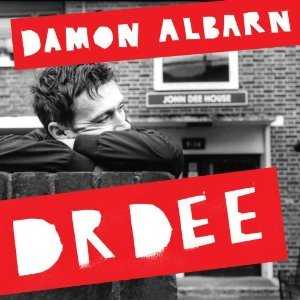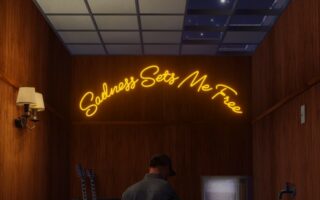 Damon Albarn is the British version of Jack White.
Damon Albarn is the British version of Jack White.
His endless indulgence in random musical enterprises seems to suggest that he is still – twenty years on from fronting Brtipop legends Blur – searching for the ultimate musical calling in life.
Unlike the former White Stripes frontman however, Albarn is yet to lose our attention, and ‘Dr Dee‘, the soundtrack to the English Opera of the same name, is the newest addition to his eclectic repertoire.
Such a concept should be approached with caution however, as seductive as a Damon Albarn solo album might sound; ‘Dr Dee’ is a cohesive musical piece that is probably best enjoyed with the accompanying visuals of the opera it was designed for. If you’re looking for an introspective look into the personal side of one of Britain’s most celebrated modern songwriters, you’re better off sifting through the Blur archives. You’ll find more depth in ‘13‘ or ‘Blur‘ than you will with this record – but that’s not necessarily a bad thing.
Opener ‘The Golden Dawn’ isn’t the most assertive introduction one could think of, but neither is it tacky or unwelcome, its just there. It lingers as though its very existence is essential to what follows, no matter how dreary the means to an end may be. Better placed are ‘Apple Carts’ and ‘O Spirit, Animate Us’. The former begins as a seamless breath of wind, Albarn’s yearning voice complimented by a watery ambient piano, whose blissful solitude is interrupted only by a striking flute solo that intercepts halfway through. The latter uses a heavenly females chorus to significant effect, providing for a much needed contrast to Albarn’s blustery bleat.
Generally, a lot of the tracks stand as one wholesome cohesive work, best listened to all at once – few are memorable in hindsight. The bleary-eyed formula can become tired throughout ‘Saturn’, ‘The Marvellous Dream’ and ‘Coronation’, each one never quite playing up to the promise displayed in their titles. But Albarn’s ability to use outside contributions economically and sparingly, in just the right places in every song, elevates the compositions greatly, and is why Gorillaz came to such international prominence.
Displaying his mischievous knack for diverse instrumentation, ‘Coronation’ and ‘A Prayer’ utilise Middle Eastern strings and European harps in an impressive fashion. Elsewhere, the female chorus in ‘Edward Kelley’ is haunting and inanimate, bowling the listener over with its strange structure and unearthly melodic contour.
Although the initial eighteen-song tracklisting might appear overtly-ambitious at first, there are few tracks over two minutes, and many of them are mood pieces used as transitional tools to convey dense imagery and haunting choral effects.
Some of these are genuinely grand and surprising moments on the soundtrack, one such is ‘Temptation Comes In the Afternoon’, a bizarre cartoon-like jingle that wouldn’t seem out of place alongside a Gorillaz film clip. The strained cries of ‘Watching the Fire that Waltzed Away’ are likewise unexpected and exciting, offering a welcome refuge from the many directionless ballads that dot the album. Some of the record’s finest moments can also be found towards the bottom end of the tracklisting; the sterling ‘Cathedrals’ and sublime closer ‘The Dancing King’ are up there with anything Albarn has composed in the last decade or so.
‘Dr Dee’ probably shouldn’t be marketed as a Damon Albarn solo album because it is anything but. It is best described as a Gorillaz album without the caricatures, the famous guest appearances and the commercial feel. It is exactly what it should be, a sparse collaborative soundtrack orchestrated masterfully by Albarn. It almost sounds as though the Gorillaz mastermind is content on leaving the corroded pop world for good, in an ambitious quest to awake the dormant genius within him, and flourish in a musical stratosphere that is far beyond what he has attempted thus far.
In that context, ‘Dr Dee’ is a transitional work; a stepping stone for Albarn to venture into the great unknown.




Dear Raphael, you write –
“Elsewhere, the female chorus in ‘Edward Kelley’ is haunting and inanimate, bowling the listener over with its strange structure and unearthly melodic contour.” The female chorus you refer to is in fact the well known veteran opera and concert Countertenor, Christopher Robson. He played and sang the role of Edward Kelley, John Dee’s scryer and nemesis, at the world premiere of DR DEE in Manchester in 2011, and will repeat his role at the ENO performances at the London Coliseum this summer. Check him out on http://www.christopher-robson.com